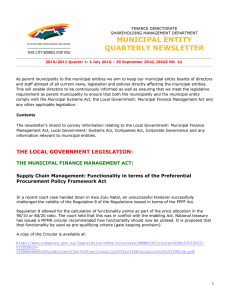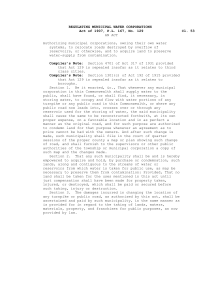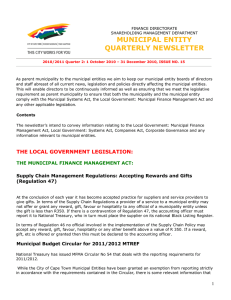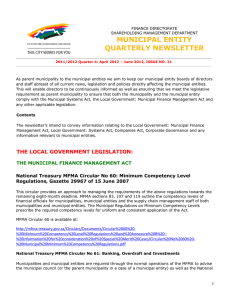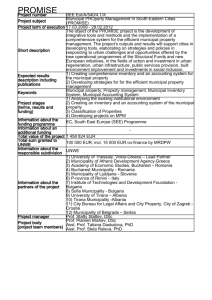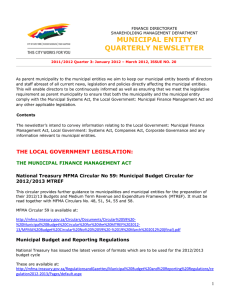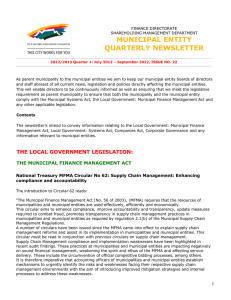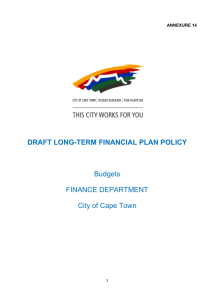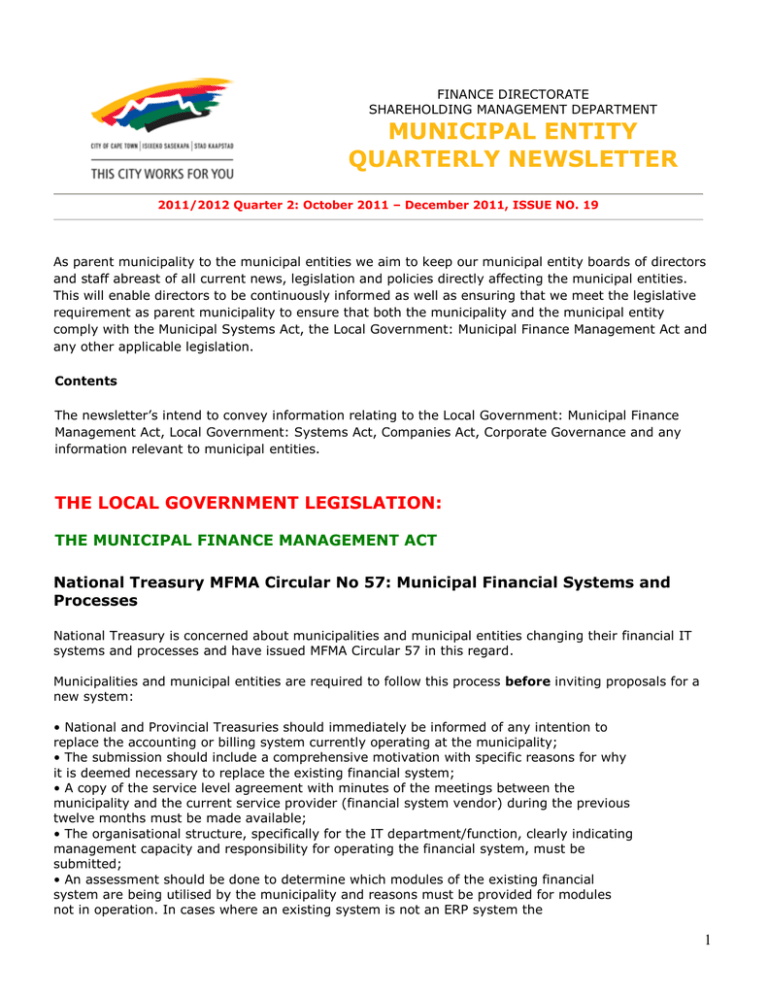
FINANCE DIRECTORATE
SHAREHOLDING MANAGEMENT DEPARTMENT
MUNICIPAL ENTITY
QUARTERLY NEWSLETTER
Analyst
2011/2012 Quarter 2: October 2011 – December 2011, ISSUE NO. 19
As parent municipality to the municipal entities we aim to keep our municipal entity boards of directors
and staff abreast of all current news, legislation and policies directly affecting the municipal entities.
This will enable directors to be continuously informed as well as ensuring that we meet the legislative
requirement as parent municipality to ensure that both the municipality and the municipal entity
comply with the Municipal Systems Act, the Local Government: Municipal Finance Management Act and
any other applicable legislation.
Contents
The newsletter’s intend to convey information relating to the Local Government: Municipal Finance
Management Act, Local Government: Systems Act, Companies Act, Corporate Governance and any
information relevant to municipal entities.
THE LOCAL GOVERNMENT LEGISLATION:
THE MUNICIPAL FINANCE MANAGEMENT ACT
National Treasury MFMA Circular No 57: Municipal Financial Systems and
Processes
National Treasury is concerned about municipalities and municipal entities changing their financial IT
systems and processes and have issued MFMA Circular 57 in this regard.
Municipalities and municipal entities are required to follow this process before inviting proposals for a
new system:
• National and Provincial Treasuries should immediately be informed of any intention to
replace the accounting or billing system currently operating at the municipality;
• The submission should include a comprehensive motivation with specific reasons for why
it is deemed necessary to replace the existing financial system;
• A copy of the service level agreement with minutes of the meetings between the
municipality and the current service provider (financial system vendor) during the previous
twelve months must be made available;
• The organisational structure, specifically for the IT department/function, clearly indicating
management capacity and responsibility for operating the financial system, must be
submitted;
• An assessment should be done to determine which modules of the existing financial
system are being utilised by the municipality and reasons must be provided for modules
not in operation. In cases where an existing system is not an ERP system the
1
municipality must provide details of any other systems utilised by the municipality;
• The date on which the existing financial system was implemented, the procurement and
implementation costs and the current operational costs thereof must be disclosed;
• A technical assessment must be undertaken on the server and network requirements of
the new financial system and a copy of such report should be submitted; and
• Copies of all IT strategies, policies and procedural documents including the IT disaster
recovery plan must be made available.
The above submissions and all enquiries must be forwarded to lgdataqueries@treasury.gov.za
or emailed to Jan.Hattingh@treasury.gov.za. A working committee comprising representatives
from the National and Provincial Treasuries, the Auditor-General and other relevant
stakeholders will assess the submissions and respond with its findings.
MFMA Circular 57 is available at:
http://mfma.treasury.gov.za/MFMA/Circulars/MFMA%20Circular%20No%2057%20%20Municipal%20Financial%20Systems%20and%20Processes%20-%2020%20Oct%202011.pdf
National Treasury Guidelines in respect of the new Preferential Procurement
Regulations
National treasury has issued guidelines in respect of the new Preferential Procurement regulations
which came into effect on 7 December 2011.
The guidelines are available at:
http://www.treasury.gov.za/divisions/sf/sc/Circulars/default.aspx
GENERAL:
National Planning Commission: National Development Plan
The National Planning Commission has released its “National Development Plan”. The web site for the
NPC states that the draft plan “charts a 20 year path towards achieving the overarching vision
embedded in the Constitution that South Africa belongs to all who live in it. It breaks the five-year
electoral cycle to allow for long-term planning. The plan opens the way for:
• The mobilisation of society around a commonly agreed set of long-term goals.
• Greater coherence in government’s work between departments which can only be achieved if there is
a common understanding of long-term objectives.
• The development of a broad consensus to encourage business and society to think about the long
term. This will provide a basis for making trade-offs and prioritising major decisions.
The draft plan addresses 13 key challenges and proposes:
1.
2.
3.
4.
5.
6.
Creating jobs and livelihoods
Expanding infrastructure
Transitioning to a low carbon economy
Transforming urban and rural spaces
Improving education and training
Providing quality healthcare
2
7. Building a capable state
8. Fighting corruption and enhancing accountability
9. Transforming society and uniting the nation
10. Creating an inclusive and integrated rural economy
11. Broadening social protection
12. Building safer communities
13. Enhancing South Africa’s role in relation to the region and the world”
The full plan can be accessed via the National Planning Commission web site:
http://www.npconline.co.za/
Please contact Louise Muller (021 4003940) or Richard Wootton (021 4002701) if you have any queries
in respect of this newsletter.
Although every effort is made to check the accuracy and quality of the information supplied, The City
cannot be held responsible for any errors that may arise.
Copyright(c) City of Cape Town 20011. All rights reserved. No part of this newsletter may be reproduced or transmitted in any form
without written permission from the City of Cape Town, Finance Directorate, Shareholding Management Department.
3


